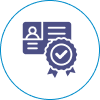1. What skills should I look for when hiring a backend developer?
Seek backend programmers who are fluent in Python, JavaScript, Ruby, or other programming languages. They ought to possess knowledge of web servers and deployment procedures, proficiency with API development, familiarity with pertinent backend frameworks, a solid grasp of database systems, proficiency with authentication and authorization, and a great aptitude for problem-solving. Soft skills are also very important; these include good communication and teamwork.
2. How can I assess a backend developer's proficiency in a specific technology or framework?
To determine a candidate's practical proficiency with the intended technology or framework, think about evaluating them using technical exams or coding examinations. Tasks like database queries, API creation, and scenario problem-solving may be included in these evaluations. Examining the candidate's prior work and code samples might also reveal details about their skill level.
3. What are the key considerations for evaluating a backend developer's experience?
Consider the difficulty of the issues a backend developer has solved, the technologies and frameworks they have worked with, and the projects they have completed in the past when evaluating their experience. Take into account their contributions to the overall architecture and design, as well as the scalability and performance features of the applications they have worked on.
4. How important is knowledge of security in backend development?
A crucial component of backend development is security. Strong knowledge of security concepts, such as data encryption, safe authentication techniques, and permission procedures, is essential for a backend developer. Examine a candidate's familiarity with common security flaws and their capacity to put precautions in place against such threats.
5. What role does collaboration play in backend development?
Because they frequently work in cross-functional teams, backend engineers must collaborate well. Seek applicants that can work well with front-end developers, QA engineers, and other team members in addition to being able to accurately express technical concepts and engage in code reviews. An climate that is both positive and productive at work is enhanced by strong collaboration skills.
6. How can I gauge a backend developer's adaptability to new technologies?
Examine a candidate's flexibility by having a conversation with them about their experience picking up new skills and being current with market developments. Find out about situations in which they effectively implemented new frameworks or tools, as well as their methodology for ongoing learning. One of the most important traits for a backend developer to have is the ability to change with the times.
7. What role does version control play in backend development?
Version control is crucial in collaborative development settings, especially when utilizing Git. Version control systems are essential for managing code repositories, tracking changes, and collaborating with team members. A backend developer should know how to use them effectively. Working with Git workflows and branching and merging are essential for effective teamwork.
8. How can I evaluate a backend developer's problem-solving skills?
Test a backend developer's ability to solve problems by using code challenges or technical interviews. Provide actual situations or difficulties pertaining to backend development, and assess the candidate's approach to problem-solving. Seek for analytical reasoning, meticulousness, and proficiency in debugging and optimizing code.
9. What role does the software development lifecycle (SDLC) play in backend development?
The software development lifecycle (SDLC), which includes stages like requirements collecting, design, implementation, testing, deployment, and maintenance, should be thoroughly understood by a backend developer. The developer will be able to contribute successfully to each stage of the development process if they are familiar with the SDLC.
10. How can I assess a backend developer's ability to communicate technical concepts?
Use talks and interviews to gauge a candidate's proficiency in explaining technical ideas. Ask them to explain previous projects, break down difficult technical topics into understandable language, and talk about how they solve problems. Successful collaboration between development teams and other stakeholders depends on effective communication.
































